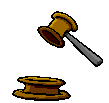

In 1969, 13-year-old Mary Beth Tinker and four other students in Des Moines, Iowa, protested the Vietnam War by wearing black armbands in school. Their school did not allow this, and they were punished for wearing the armbands. The students and their parents promptly filed suits complaining that this punishment had violated the students� freedom of speech. This battle went to the U. S. Supreme Court, and the justices sided with the students. In a landmark decision, the justices stated that students do not �shed their constitutional rights to freedom of speech or expression at the schoolhouse gate.� This decision was an important victory for students� rights, as it gave students across the country the ability to have a voice of their own.
http://laws.findlaw.com/us/393/503.html

In 1986, a high school student in Pierce County, Wash., gave a speech at a school assembly nominating his friend for a student government position. This speech was considered objectionable by school officials because they complained that it was filled with sexual innuendos. Because of this, the school suspended the student. This student sued the school, arguing that the suspension violated his free speech rights. When the case finally reached the U.S. Supreme Court, the justices decided that it was OK for the school to punish the student. They said that a school could prohibit vulgar behavior or speeches as a part of its job of teaching students �the boundaries of socially appropriate behavior.�
http://laws.findlaw.com/us/478/675.html

Hazelwood School District v. Kuhlmeier, 1988.
In the Hazelwood School District in St. Louis, Mo., a group of journalism students decided to print an article on teen pregnancy in their school newspaper; however, the school principal decided to remove the article, saying that it was �inappropriate� for the younger students in the school. The student challenged the principal�s ability to remove articles from their newspaper. They stated that it was a violation of their free speech. In the U.S. Supreme Court, the justices decided that, as long as he showed good reason, the principal could in fact keep certain articles out of the newspaper because it was school-sponsored. The court believed that the principal�s keeping inappropriate material away from students was a good enough reason to merit removal of the article.
http://laws.findlaw.com/us/484/260.html

Burch v. Barker, 1998
At a school-sponsored barbecue, a few high school students passed out copies of their underground newspaper without getting permission from the school. Their school policy stated that underground newspapers had to be approved by school officials before being distributed in school. When the students were punished for distributing their paper, the students and their parents challenged the school�s policy in court. Eventually, the U.S. Court of Appeals on the West Coast ruled in favor of the students� argument. Because the underground newspaper had not been sponsored by the school in any way, the school had no control of it. The court then proceeded to strike down the school�s unconstitutional policy.
http://jcomm.uoregon.edu/~tgleason/j385/cases/Burch_j385.html
